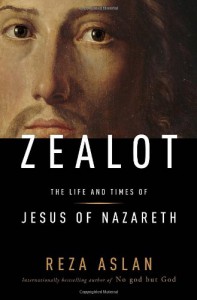1
Followers
24
Following
Interrupting Soliloquy
I enjoy most things, and don't believe that enjoying things means that I shouldn't rip it apart critically.
Also don't think reading is the panacea of all ills, so I read a lot of comics and play a lot of video games.
Zealot: The Life and Times of Jesus of Nazareth
 If (with the emphasis on if) there were nothing else to say about this book, I would call it interesting. The life of Jesus is needless to say something of a fascination in our current culture and lifetime (and probably will continue ages into our future) and has irrevocably shaped thousands of countries and lives - not always for the better. I think what has fascinated us most about Jesus, however, is the fact that he was human. Or at least, that he walked among us in our guise. He was with us, spoke to us as humans, and I think that, beyond all else, has cemented this Jesus obsession more than anything. So to read a book that picks away at the mythology to get to the core and reality of this human was incredibly interesting, even amazing, but the fact that this book is relatively short considering the years of work Aslan has put into it shows how ostensibly unattainable the historical Jesus continues to be, until we uncover his diary or something.
If (with the emphasis on if) there were nothing else to say about this book, I would call it interesting. The life of Jesus is needless to say something of a fascination in our current culture and lifetime (and probably will continue ages into our future) and has irrevocably shaped thousands of countries and lives - not always for the better. I think what has fascinated us most about Jesus, however, is the fact that he was human. Or at least, that he walked among us in our guise. He was with us, spoke to us as humans, and I think that, beyond all else, has cemented this Jesus obsession more than anything. So to read a book that picks away at the mythology to get to the core and reality of this human was incredibly interesting, even amazing, but the fact that this book is relatively short considering the years of work Aslan has put into it shows how ostensibly unattainable the historical Jesus continues to be, until we uncover his diary or something. The book focuses a lot of the history and politics of the area at the time to set the scene and form the idea of what a man calling himself a messiah during the tumultuous time period would be like. Aslan constantly cross-references the gospels against each other to try and figure out what Jesus said and what he didn't, and really puts emphasis on the bizarre mistranslations that led to who we now understand to be Jesus Christ, not to mention the definite cases of winners writing the history books. The lack of information and first-person accounts make it incredibly difficult to decipher what is going on, and indeed, what we are left with is still a fairly loose sketch left behind by the negative space of the few puzzle pieces we have. But what we see is so different than expected and yet almost equally impressive to the point that it's hard to end the book feeling that Jesus is somehow ruined.




